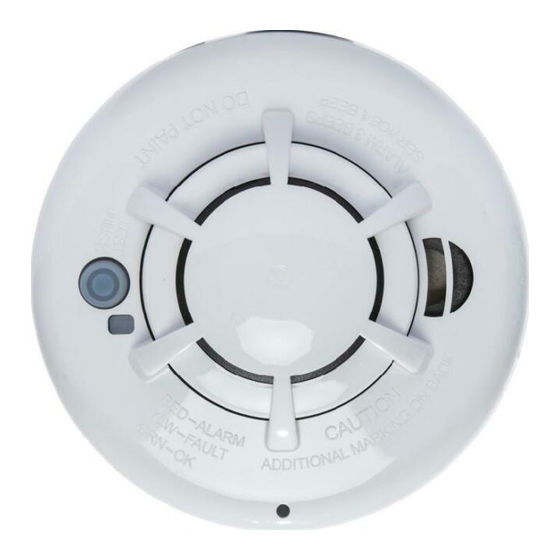Apollo 51000-355 Manuel d'installation - Page 7
Parcourez en ligne ou téléchargez le pdf Manuel d'installation pour {nom_de_la_catégorie} Apollo 51000-355. Apollo 51000-355 16 pages. Wireless smoke heat alarm

IF THE ALARM SOUNDS
• If the smoke alarm sounds, get out and stay out. Never go back inside
for people or pets.
• If you have to escape through smoke, get low and go under the smoke
to your way out.
• Call the fire department from outside your home. FOR MORE SAFETY
INFORMATION SEE THE WEBSITE: www.nfpa.org/education.
SPECIFICATIONS
• Transmitter Frequency: 345.000 MHz (crystal controlled)
• Dimensions: Ø 5'' x 2.5'' high (Ø 125mm x 63mm high)
• Weight (including battery): 8.57 oz (243 g)
• Color: White
• Spacing rating: 70ft
• Audible Signal (ANSI Temporal 3): 85dBA min. in alarm
• Sensitivity: 1.26 - 2.39%/foot
• Operating Temperature: 40°-100°F (4.4°-37.8°C)
• Supplementary heat rating: 135°F
• Relative Humidity: 15-90% Non-Condensing
• Battery (included): Three (3) AAA PC2400 Duracell Procell or three (3)
AAA Energizer E92 batteries
• Regulatory Listing: UL 217
• Warranty: Two (2) years
• Included Accessories: Mounting Hardware Package
REGULATORY INFORMATION NOTICE:
Unauthorized changes or modifications could void the user's authority to
operate the equipment.
This device complies with Part 15 of the FCC Rules and Industry Canada
licence-exempt RSS standard(s). Operation is subject to the following two
conditions: (1) This device may not cause harmful interference, and (2) this
device must accept any interference received, including interference that
may cause undesired operation of the device.
This equipment has been tested and found to comply with the limits for
a Class B digital device, pursuant to Part 15 of FCC Rules. These limits are
designed to provide reasonable protection against harmful interference in
a residential installation. This equipment generates, uses and can radiate
radio frequency energy and if not installed and used in accordance with
the instructions, may cause harmful interference to radio communications.
However, there is no guarantee that interference will not occur in a particular
installation. If this equipment does cause harmful interference to radio or
television reception, which can be determined by turning the equipment
off and on, the user is encouraged to try to correct the interference by one
or more of the following measures:
• Reorient or relocate the receiving antenna.
• Increase the separation between the equipment and the receiver
• Connect the equipment into an outlet on a circuit different from that
to which the receiver is connected.
• Consult the dealer or an experienced radio/television technician for
help
"For your information, The National Fire Alarm Code, NFPA 72, reads as
follows:
"11.5.1 Required Detection."
"Where required by applicable laws, codes, or standards for a specific type
of occupancy, approved single- and multiple-station smoke alarms shall be
installed as follows:
1. In a sleeping rooms and guest rooms
2. Outside of each separate dwelling unit sleeping area, within 6.4 m
(21 ft) of any door to a sleeping room, the distance measured along
a path of travel
3. On every level of a dwelling unit, including basements
4. On every level of a residential board and care occupancy (small
facility), including basements and excluding crawl spaces and unfi
nished attics
5. In the living area(s) of a guest suite
6. In the living area(s) of a residential board and care occupancy.
(Reprinted with permission from NFPA 72®, National Fire Alarm Code
Copyright © 2007 National Fire Protection Association, Quincy, MA 02269.
7
INST APD0601 C160927
